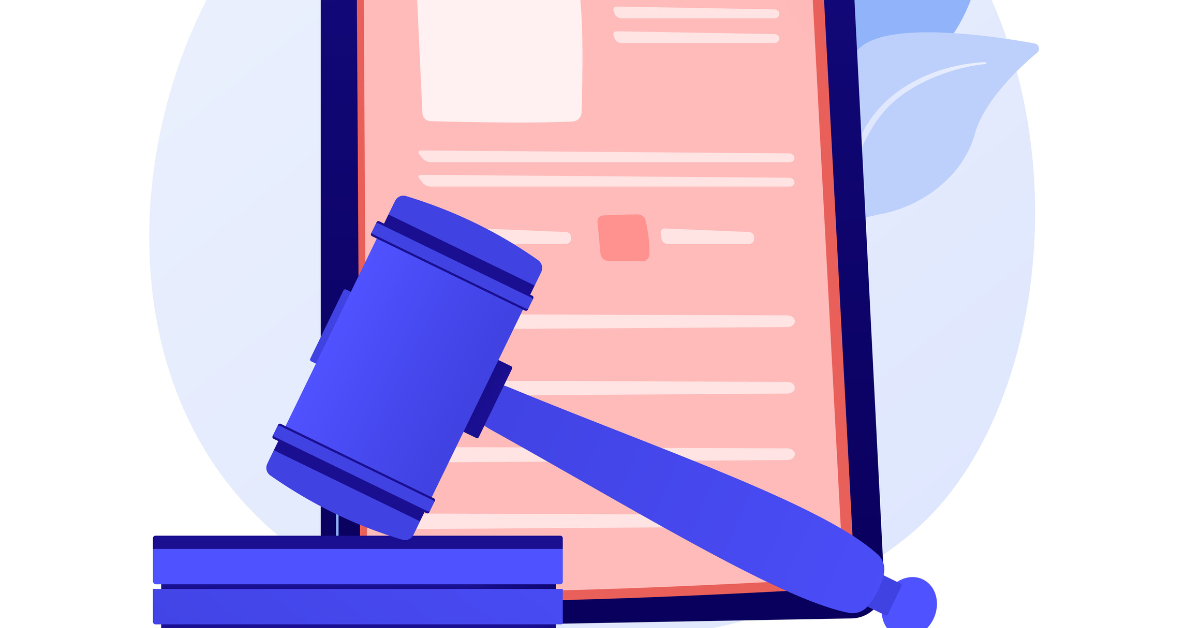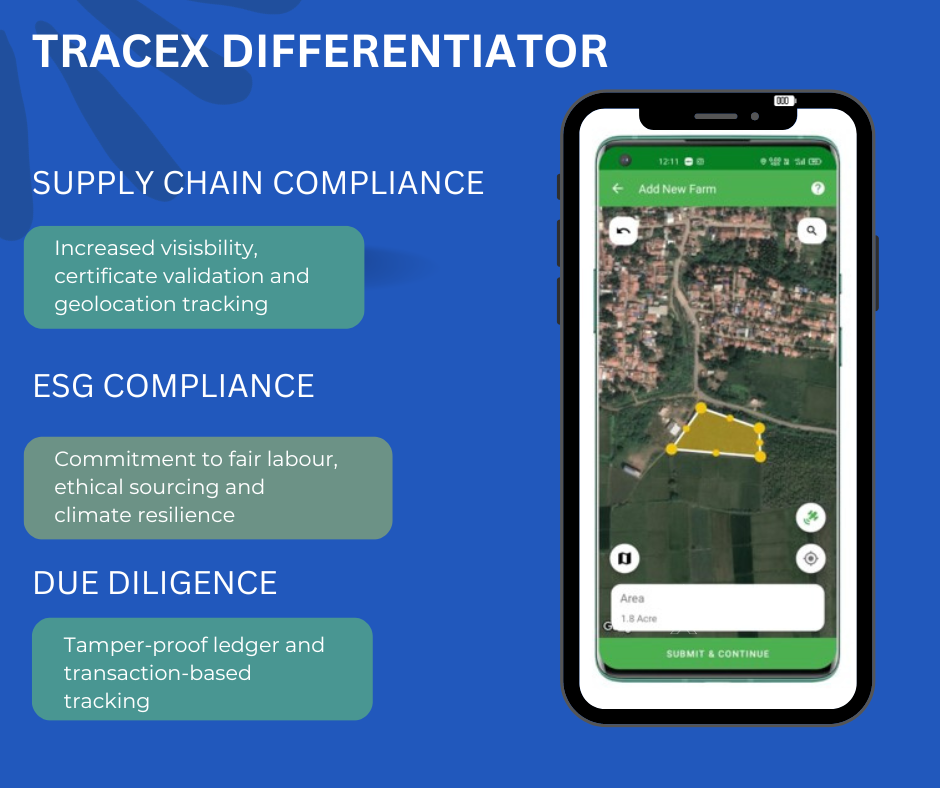Contact: +91 99725 24322 |
Menu
Menu
Quick summary: Explore the pivotal role of traceability in achieving supply chain compliance. Learn how TraceX's blockchain solutions empower companies to ensure transparency, sustainability, and adherence to regulations.

When it comes to tracking and tracing, are businesses equipped to navigate the complex landscape of compliance and regulations? For companies striving to meet compliance requirements and regulatory standards, ensuring accurate traceability can be a daunting challenge. Compliance mishaps can lead to costly consequences and reputational damage. Regulatory compliance has become a non-negotiable imperative. The consequences of falling short on compliance can extend from significant financial penalties to irreparable harm to a company’s image and trustworthiness.
The good news is, with the right traceability tools and strategies, businesses can achieve compliance and regulatory adherence efficiently and effectively. From supply chain transparency to data accuracy, the tools are available to make compliance a breeze.
According to the Supply Chain Sustainability School, it was revealed that 68% of retail companies included in the study are proactively monitoring and mitigating compliance-related risks within their supply chains. This finding underscores the growing awareness among retailers regarding the significance of compliance in supply chain management, aimed at risk mitigation and upholding ethical business standards.
In this blog, we’ll delve into the world of traceability for compliance and regulations, exploring the essential solutions and best practices to keep your business on the right side of the law. We will delve into the multifaceted realm of compliance, its diverse implications for different industries and regions, and how traceability serves as the North Star for navigating these constantly changing regulatory waters.
Supply chains in various sectors are facing increasing scrutiny due to environmental and social infractions. Gradually, the shift is occurring where sustainability is not just a choice but an essential requirement. Significant emphasis is now placed on social sustainability, with regulations taking the lead in promoting traceability, accompanied by a growing emphasis on ethical consumption and responsible investment.
The number of social regulations globally increased by approximately five times from 2017 to 2022, with the expectation for more to come in the future.
Regulatory compliance is the meticulous adherence to the laws, rules, and standards set forth by governmental authorities and industry regulators. It’s far more than a mere checkbox exercise; it’s the bedrock of ethical practices, safety assurance, and trust-building.
Traceability is the cornerstone upon which compliance is built. It entails the ability to track and trace products, data, and processes throughout their entire lifecycle. Traceability serves as the foundation that enables organizations to collect and report the data necessary to meet regulatory standards.
Why do organizations struggle to access information about the origins of their raw materials? The limited adoption of supply chain traceability and an incomplete chain of custody process at the raw material level are major contributors to this issue. Even when organizations attempt to implement traceability practices, they often fall short of their goals, primarily because they embark on these efforts without a clear sense of purpose, objectives, or targets.
To establish a robust and audit-proof traceability solution or framework, the first crucial step involves comprehensive supply chain mapping. While some companies may have a good grasp of the initial tiers of their supply chains, such as their direct suppliers or manufacturers, they often lack visibility into the subsequent tiers. This lack of visibility can result in limited knowledge of the extended supply chain, hindering aspects like tracking Scope 3 emissions, particularly for downstream suppliers. Mapping all tiers of the supply chain is essential to achieve full transparency and ensure comprehensive traceability.
Having real-time supply chain tracking is an indispensable component of an effective traceability solution. It provides the capability to swiftly and continuously monitor your products as they move through the supply chain, enabling rapid issue identification. This feature plays a pivotal role in upholding quality standards, safeguarding your supply chain integrity, and achieving a range of benefits. These include ensuring quality compliance, preventing the dissemination of contaminated products, and enhancing forecasting accuracy. All of these advantages collectively contribute to minimizing the risk of expensive recalls and preserving your brand’s reputation.
Establishing proof of provenance, which involves having concrete evidence of a product or material’s precise origin, plays a pivotal role in attaining traceability and compliance. To strengthen your proof of origin, it’s essential to incorporate verifiable geo-location data. This means that you possess data that can authenticate the exact location of your materials or ingredients, down to the specific polygon of land where they were cultivated. A robust traceability solution is instrumental in transitioning from relying on surface-level shipping data and sporadic audits to acquiring tangible, geo-located proof of provenance.
An essential component of an audit-proof traceability solution is a digitized audit trail, enabling you to capture and retain comprehensive, real-time data within a unified platform or system. This feature simplifies the process of conducting internal audits and expedites report generation, ensuring you remain compliant. From a more technical standpoint, a traceability solution built on blockchain technology is highly advantageous. Blockchain enhances your capacity to capture the purest, most auditable digitized data while ensuring its utmost security.
An effective traceability solution should possess the capability to produce comprehensive reports offering insights into your entire supply chain, product chain of custody, and sustainability/ESG metrics. These reports should be user-friendly, easily generated, and offer a transparent snapshot of your compliance status. This functionality is invaluable for recognizing compliance challenges and implementing corrective measures to ensure your readiness to meet present and forthcoming regulations.
Each industry grapples with a unique set of regulations. The food sector contends with food safety and labeling standards, while pharmaceuticals must adhere to stringent drug safety and efficacy guidelines. The electronics industry is subject to RoHS (Restriction of Hazardous Substances) compliance, while data privacy regulations have a profound impact on tech and online businesses.
Traceability solutions are tailor-made to meet the specific demands of each industry. In the food sector, traceability involves tracking the source and journey of ingredients. In healthcare, it encompasses serialization to prevent counterfeit drugs. In electronics, it deals with the management of hazardous substances in products. In the realm of data privacy, it focuses on securing personal information and ensuring compliance with data protection regulations.
A range of technologies, including blockchain, Internet of Things (IoT), and Radio-Frequency Identification (RFID), play a pivotal role in the traceability landscape. These technologies furnish the tools and systems necessary for tracking and tracing products and data.
Data security and privacy are paramount in traceability systems. The mishandling of sensitive data can lead to legal and reputational consequences. GDPR and other data protection regulations mandate responsible data management.
Traceability enhances transparency by providing a clear view of a product’s journey. It establishes accountability within the supply chain, enabling organizations to identify and rectify issues promptly.
TraceX blockchain traceability systems offer a robust framework that not only helps companies maintain compliance but also streamlines the compliance process, reduces the risk of violations, and enhances transparency and trust throughout the supply chain.
The TraceX platform seamlessly connects every layer of your value chain into a single system, simplifying the process for your internal and external auditors to delve deep into the levels of scrutiny and due diligence necessary for regulatory compliance. In our system, auditors can be granted controlled access to the pertinent data essential for conducting their audits. Rest assured, our platform fully adheres to GDPR regulations and offers permissioned access to auditors, enabling them to obtain the information necessary for their audit tasks. Built on blockchain technology, it guarantees audit-proof data capture and reporting. The platform can be tailored to capture all the traceability requirements stipulated for compliance and auditing.

TraceX is a cutting-edge traceability solution designed to assist global enterprises in enhancing their business performance through actionable sourcing compliance insights, comprehensive end-to-end supply chain data, and easily auditable procurement and ESG reporting. Curious to know if TraceX is the right fit for your business? Don’t hesitate to schedule a call with us today!
The traceability landscape is in a perpetual state of evolution, with trends like AI-enhanced traceability analytics, blockchain integration, and enhanced cybersecurity measures. These trends promise to reshape how organizations achieve and demonstrate compliance.
In a world where regulatory compliance is non-negotiable, traceability stands out as a pivotal force for ensuring accountability, transparency, and adherence to regulations. It’s more than a mere compliance requirement; it’s the cornerstone of responsible and trustworthy business practices. The ever-evolving landscape of emerging technologies and regulatory demands signifies a future of growth, innovation, and adaptation for traceability and compliance. This journey is one that organizations must embark upon to ensure not only regulatory adherence but also the trust and confidence of consumers and stakeholders. Traceability is not just an option; it’s the compass that guides us through the complex landscape of compliance and regulations.
